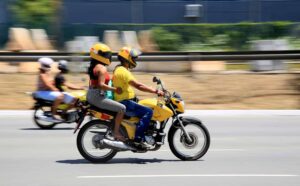The governor of São Paulo, Tarcísio de Freitassanctioned a new law that regulates the transport of passengers by motorcycle in the state. From now on, it will be up to each municipality to decide whether to allow or prohibit the activity of motorcycle taximodality that normally operates through applications.
THE Law 18.156approved by the Legislative Assembly, was sanctioned on June 23, 2025 and published in this Tuesday’s edition (24) State Official Gazette. According to the text, motorcycle transport can only occur if there are local regulation, with specific rules defined by each city.
How the new regulation for Mototaxis of the State of SP
The legislation establishes that the service of motorcycle taxi can only be provided by municipal authorization. Each city will have autonomy to decide whether or not to release this type of transport and, if allows, should define criteria and requirements for operation.
Among the drivers’ obligations are:
- National Driver’s License (CNH) in category Awith annotation of paid activity;
- Negative Criminal Background Certificate;
- Vehicle within the standards required by municipal legislation and traffic authorities;
- INSS registration as an individual taxpayer.
In addition, the law provides for the collection of municipal taxes and the application of Fines in case of non -compliance. The text still classifies as illegal activity Any motorcycle transportation operation that does not meet the established requirements.
The standard also states that regulation is periodically reviewed, at most every five years.
Mototaxi remains forbidden in the city of São Paulo
In a note, the São Paulo City Hall reported that, even after the sanction of the law, the transport of passengers by motorcycles remains forbidden in São Paulo. The decision is formalized through a municipal decree.
“The law sanctioned by the government of São Paulo searches the path taken by the City of prohibit mototaxi service in the city. The Municipal Administration has been strongly acted to prevent a hazardous modal of transport from accidents that resulted in passenger deaths, ”the municipal management said.
The mayor Ricardo Nunes reinforces that Accident and Death Risks were decisive in the decision. For him, the new law ensures that each municipality can evaluate its reality and thus preserve lives.
The theme has been generating legal clashes between the City Hall and application transport platforms. Companies argue that there is support in a federal law that allows the servicewhile the municipality argues that the prohibition is justified by concern for users’ safety. This debate also advances in São Paulo City Council.
According to data released by the city, only 2024 were spent R $ 35 million with care to victims of motorcycle accidentsresulting in 4,084 hospitalizations in the public network. From January to June 9, 2025, 6,209 accidents involving motorcycles in the city.
Read more:
Criticism of the technology and mobility sector
THE Brazilian Association of Mobility and Technology (AMOBITEC)which represents companies as Uber and 99classified the law as unconstitutional and harmful to the sector.
“The sanction of Law No. 18.156/2025 is unconstitutional and represents a serious setback for mobility, income generation and legal certainty Throughout the state, ”said the entity in a statement.
According to AMOBITEC, the legislation Creates legal insecurity And it can negatively impact millions of workers and users who depend on the motorcycle taxation in São Paulo. Currently, the model is present in More than 500 municipalities of São Paulowhere 5 million users They are in the metropolitan region.
For the association, by passing on to the municipalities the power to authorize or prohibit the service, the law Viola Constitutional Principleslike the free enterprise and the exclusive competence of the Union to legislate on traffic and transportation.
The entity also reported that it will evaluate all appropriate judicial measures to guarantee the right of workers and users to mobility and innovation in the state.











